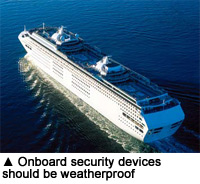Cruise ships require comprehensive solutions integrating notification, security and life safety systems.
Cruise ships require comprehensive solutions integrating notification, security and life safety systems.
The high seas beckon adventurers, but command their respect as well. As a misstep could be deadly, cruise ship voyages must prepare for the worst with sufficient supplies and emergency equipment.
Cruise ships ensure top-to-bottom security. "These companies invest in rigorous training of onboard staff to operate advanced and often integrated security systems, including surveillance, command and control centers, fire and access control systems, to deal with such events, including using forensic technology to investigate at a high level," said David Fairnie, Global Ports Solutions Director for G4S.
Detection is the first line of defense for comprehensive cruise ship security. "Cruise lines typically use two to three technologies for passengers or cargo," said Brook Miller, VP of Smiths Detection. "The cruise lines first use metal detectors or magnetometers. The other is X-ray screening, used for articles passengers want to bring onto the cruise ship and baggage, but also for cargo. The third technology used is explosive-trace detectors, used to detect residues of explosives."
Some screening equipment can be taken onboard. "Some cruise ships carry all three technologies, which are stored in the galley areas on the ships themselves," Miller said. "They are accessible and usable in any port of call. For larger items, including the bundles and pallets of food, liquor and towels, they use the port-side, high-energy screening before they get on the ship."
Access Control
 Managing doors on a ship is essential, with critical areas such as the engine room requiring tougher security than staterooms.
Managing doors on a ship is essential, with critical areas such as the engine room requiring tougher security than staterooms.
"I've taken many cruises, and your key card is your lifeline," said Bob Swoope, VP of Sales for Alarm Lock Systems. "The information about your stay is coded on a magnetic stripe. That type of product is less heavy-duty, has less volatility and less wear and tear."
Alarm Lock supplies rugged access control solutions. "We are typically used in the leisure world for the employee access area," Swoope said. "That area gets much more use and requires much higher commercial grade products. In fact, we have several hundred units on cruise ships on the Alaska Marine Highway."
Door solutions for cruise ships should have a small footprint, suited for tight spaces.
Notification
Emergency notification was developed for military vessels, making it native to cruise ships. "It's not that new to the marine world, with intercoms for emergencies common on vessels," said Cosimo Malesci, cofounder and VP of Marketing for Fluidmesh. "It takes a long time to deliver a message from one part of the ship to another."
Clarity is of utmost importance for mass notification when lives are at stake. "Our first prototype weatherproof loudspeakers were built for Royal Caribbean Cruises," said Rodger von Kries, VP of Technomad. "These initial products addressed the most basic problems of survivability and intelligibility. A warning system isn't much good if the output devices, or loudspeakers, have rusted through or have fast-food drive-through vocal quality."
 Barix, a provider of network audio systems, has experience with military vessels. "On a modern cruise ship, weight, corrosion and vibrations all suggest the use of 'less' cable, more fiber, and a common IP infrastructure or fiber backbone," said Johannes Rietschel, founder and CEO of Barix.
Barix, a provider of network audio systems, has experience with military vessels. "On a modern cruise ship, weight, corrosion and vibrations all suggest the use of 'less' cable, more fiber, and a common IP infrastructure or fiber backbone," said Johannes Rietschel, founder and CEO of Barix.
The networked notification and intercom solution is decentralized. "This is significant because if there is a major disaster, a local paging station on deck 7 will still be able to communicate with other devices, even if the backbone to other decks is ripped or dysfunctional," Rietschel said.
Evacuations require clear audio. "The foremost function of this public address and voice evacuation system is to get people to safety in a hazardous situation such as a fire in an organized way and as fast as possible," said Martijn van Overveld, Product Marketing Specialist for Communications Systems, Bosch Security Systems. "Especially on a ship, where a relatively small crew will have to guide a large number of middle-aged and elderly people to safety, correct and timely instruction is an absolute must."
Cruise ship solutions must meet marine standards. "The latest Bosch release fits the typical requirements for an onboard voice evacuation system and is fully compliant with the guidelines that are set by the Safety of Life at Sea Convention as applicable for marine sound applications," van Overveld said.
 Video Surveillance
Video Surveillance
Applications
Cameras keep an eye out on cruise ships, aiding crew members. "Some parts of a ship are monitored very carefully, such as the engine room or main control station," Malesci said. "If anything happened, it could hurt the whole ship."
Edge devices can help monitor critical areas. "Video cameras in an area with little activity can use motion detection, such as the engine room," said Brian Lane, Senior Product Manager for Spectra, Pelco (a Schneider Electric company). "If someone attempts to plant a bomb or is unauthorized to be there, the camera will detect motion in that area and send an alarm to the security officer."
Along with security, cameras can watch for safety. "You can put cameras in sensitive areas to detect if there are leaks or issues with ships," Lane said. "You might want to put one in the engine room, so if the captain loses power or hears a weird sound, he can check for visible issues such as smoke or someone tinkering with the controls."
Passenger safety is a top marine priority. "Thermal cameras can distinguish if there are pirates coming toward ships," Lane said. "This is used not just for cruise ships but ships in general, because of the man-overboard situation at night. A huge cargo ship can take miles to slow down and without a thermal camera, it may be impossible to see a person floating in the ocean at night."
Analytics can also assist passengers in the water. "Man overboard can be monitored by having cameras pointed at the edge of the ship, which can identify if  something appears to be leaving the ship or crosses some other virtual boundary," said Erik Laurence, VP of North Asia, Verint Systems.
something appears to be leaving the ship or crosses some other virtual boundary," said Erik Laurence, VP of North Asia, Verint Systems.
Intelligent video can speed up responses as well. "The ship is a big environment with many floors," Laurence said. "It helps to have surveillance analytics intelligently trigger action based on events detected in live video or find recorded video quickly."
Business intelligence helps operators understand passengers. "At a typical mall, people go there for a purpose. On a cruise ship, people shop because they're in a captive environment," Laurence said. "Our video systems have retail traffic analysis. Heat maps show which parts of the retail environment passengers are most attracted to, while path maps show how people navigate a retail environment."
At port, video continues to play a role in cruise ship security. "Let's say a cruise ship is in town for five days," Malesci said. "You can place temporary cameras around the cruise ship or on it to monitor the surrounding areas."
Product Needs
Marine environments place exacting demands on equipment. "Typically, a cruise ship uses stainless steel camera housings to protect against rust from the salt spray and water," Lane said. "If it's toward the front of the ship, users may go with a pressurized version filled with nitrogen. A pressurized housing protects against moisture, dust and airborne contaminants."
Transmission devices need to be rugged. "The wireless frequencies we use are not sensitive to weather factors from rain to snow," Malesci said. "We have our IP68 outdoorrated solutions for tough environments."
Products must be compact aboard ships. "You're dealing with a very tight space that's difficult to wire," Laurence said. "You need a recorder that supports many inputs. Cruise ships also need a high-density encoder to minimize rack space and power, as well as weatherproof wireless encoders to minimize wiring complexity."
IP Solutions
"IP is the future," Laurence said. "The key to this is flexibility. Customers need platforms that can support solutions for yesterday, today and tomorrow."
Digital deployments are de facto for current ships. "If you are building a new cruise ship, you will want to install an IP security system so that you can take advantage of megapixel cameras, video analytics, IP recording and the ability to view a camera remotely," Lane said.
The migration to IP may not benefit all users. "If you have an analog system already installed in a cruise ship, unless you need megapixel cameras or video analytics, it may not make sense to upgrade the entire system to IP," Lane said. "IP will introduce some latency for PTZ cameras and won't improve the image quality over analog, unless you migrate to megapixel."
IP unifies disparate systems as a cohesive solution. "We see IP-based network communications as the evolutionary path of all intelligent devices, whether we're talking about HVAC, VoIP, physical security information management, industrial control or video surveillance," said James Ionson, CEO of Oncam Global. "What IP brings to the party is a reliable, inexpensive and pervasive interconnection strategy  that can be shared by different subsystems, scaled to enormous proportions and linked to global communications."
that can be shared by different subsystems, scaled to enormous proportions and linked to global communications."
Integration breaks down system barriers. "The direct connection option of the public address system to a fire alarm system by open interfaces or supervised contacts makes possible the automation of an evacuation in case of an emergency," van Overveld said.
A converged response can save precious time. "If users monitor something on level 3 but do not have someone to fix it, the use of the system stays limited," Malesci said.
Another benefit of networking is lower cost. "IP allows us to provide sophisticated Web configurations of complex devices," von Kries said. "These devices would be vastly more expensive if physical controls were required for all the features we can manage via Web."
Networks need redundancy. "If a network or master-control program fails, you can see cascading system failures," von Kries said.
As cruise ships embark on IP, they experience the benefits of connectivity.
However, interoperability issues remain, and system downtime is unacceptable. Cruise ships require redundant security solutions for smooth sailing.